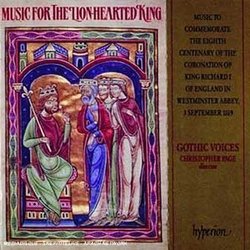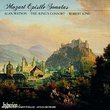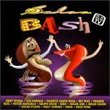| All Artists: De Nesle, Gothic Voices, Page Title: Music for the Lion Hearted King Members Wishing: 2 Total Copies: 0 Label: Hyperion UK Release Date: 11/16/1993 Album Type: Import Genre: Classical Styles: Historical Periods, Early Music Number of Discs: 1 SwapaCD Credits: 1 UPC: 034571163369 |
Search - De Nesle, Gothic Voices, Page :: Music for the Lion Hearted King
 | De Nesle, Gothic Voices, Page Music for the Lion Hearted King Genre: Classical
|
Larger Image |
CD DetailsSimilar CDs
|
CD ReviewsCarnage, Sin, Penance, Painful Love... It's all here... ewomack | MN USA | 08/15/2004 (5 out of 5 stars) "This CD commemorates the eight hundreth anniversary of King Richard the First's coronation in Westminster Abbey. The world then bled the blood of the Crusades, and Richard himself soon called the Third Crusade to regain the Holy Cross from the Muslim armies near Nazareth. War, death, and uncertaintly hung over everything. Happiness came in short bursts, if at all. The songs on this CD, sung in Latin and French, reflect the times of their composition: The world declining into ruin, proving by many signs that it is collapsing, exposes its deceitfulness and Death has harshly raged within your borders, and now you can offer no deeds as resistance to the assault of Death; therefore enter into grief always intent on lamentation. No instruments adorn the singing on this CD. Soloists or groups of two to four singers perform each piece, sometimes overlapping melodies and harmonies with dazzling technicality. Each track glows with vocal virtuosity. The effect heightens with each successive listen. Humans may never come closer to time travel than the words and music of the past, and this CD exudes the feeling of a different time. Not surprising considering that the compositions date from approximately 1170 to 1190. Some of the dates remain unknown, along with many of the composer's names. Nonetheless, some names appear, such as Gace Brulé, Blondel, and 'Li Chastelain de Couci'. Apart from destruction and the ubiquitous medieval Christian themes of sin and redemption, the CD also includes another theme associated with medieval times: love. The songs sung in French mainly concern love of a painful medieval kind: Nature has never endowed anything with more beauty. For her I shall continue the tradition of Aeneas and Paris, of Tristan and Pyramus, of all whom loved long ago. Now I shall be their ally, And now I pray to God above, That I might share their fate. Strangely, King Richard receives only one direct reference. 'In Occasu Sideris' seems to foreshadow Richard's reign, but does not mention his coronation. In a sense the title of the CD misleads; the music here represents music of the era, not necessarily music performed at Richard's actual coronation ceremony. The CD book does not delineate the how or why behind the compilation of the songs apart from their common date range. This does not detract from the incredible music. So, listen to this CD as a great representation of the music of the early twelfth century. After all, Richard probably enjoyed most of these songs in his lifetime." Review (from Gramophone) Slobberer | Astoria, NY United States | 01/26/2009 (5 out of 5 stars) "Music for the Lion-Hearted King Gothic Voices / Christopher Page. Hyperion © CDA66336 (60 minutes: DDD: 10/89). Texts and translations included.
Anonymous Twelfth Century: Mundus vergens. Novus miles sequitur. Sol sub nube latuit. Hac in anni ianua. Anglia, planctus itera. Etras auri reditur. Vetus abit littera. In occasu sideris. Purgator criminum. Pange melos lacrimosum. Ver pacis apperit. Latex silice. Gace Brule: A la doucour de la bele seson. Blondel de Nesle: L'amours dont sui espris. Ma joie me semont. Gui IV: "Li chastelain de Couci" Li nouviauz tanz. Christopher Page has a remarkable gift for creating enthralling programmes of early music bound together by a brilliantly-chosen central theme, or appellation. This new collection is no less distinguished and every bit as fascinating, musically and historically. Whether or not Richard himself ever actually listened to any of these pieces is beside the point: they are all representative of the period of his lifetime and are gathered together here in his name for the 800th anniversary of his coronation (1189). Two types of twelfth-century vocal music are represented: the conductus - which can be written for one, two, three or even four voices and the chanson, or noble, courtly love song. The singers cannot be applauded too highly for performances marked by an extraordinary insight into how this music should be tackled, that is, with a fair degree of restraint as well as know-how, given the sort of audience it might have had in Richard's day: the royal court or the household of some high-ranking ecclesiastical figure. " |

 Track Listings (16) - Disc #1
Track Listings (16) - Disc #1



